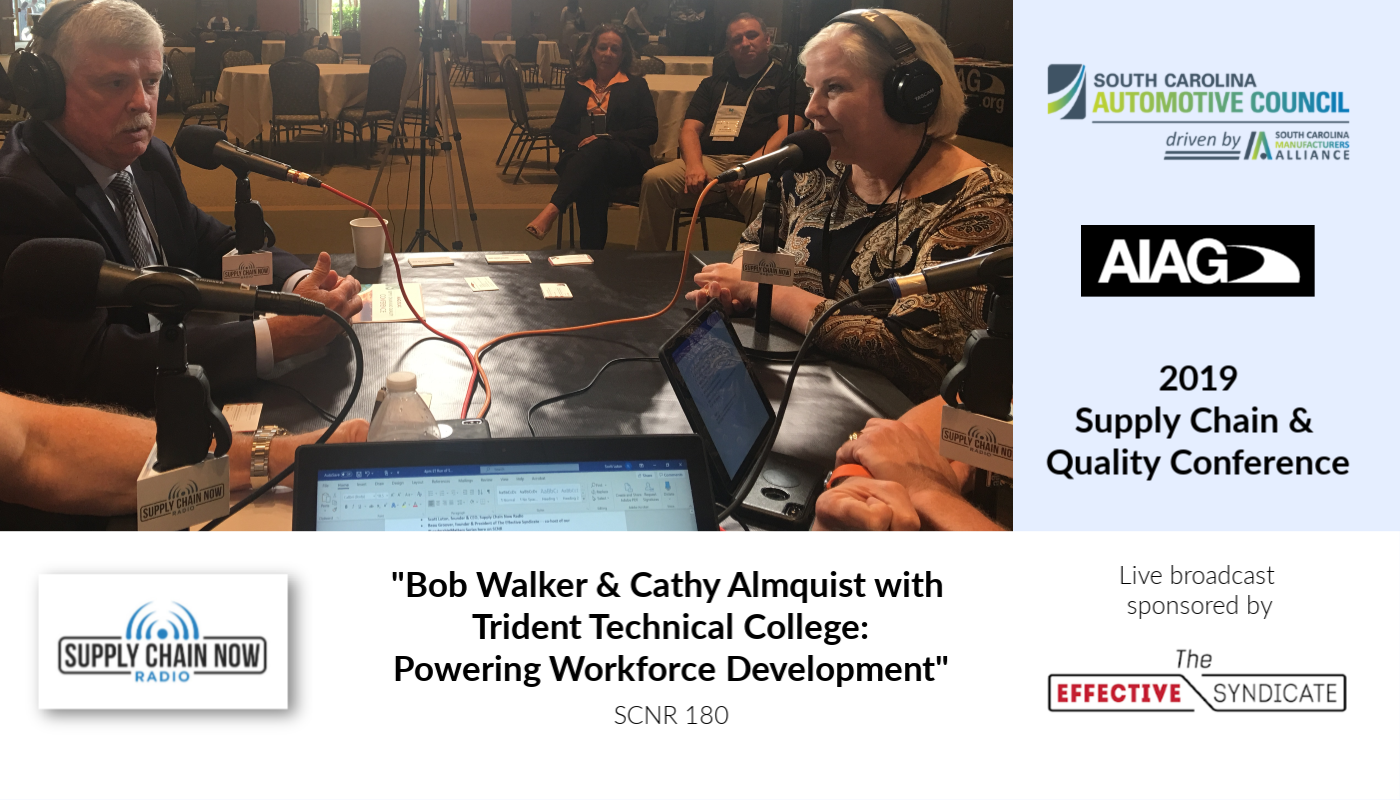Prefer to watch the podcast in action rather than just listen? Watch Scott, Greg, and Beau as they interview Bob Walker and Cathy Almquist for SCNR Episode 180 at the AIAG SCAC Supply Chain and Quality Conference in Charleston, South Carolina.
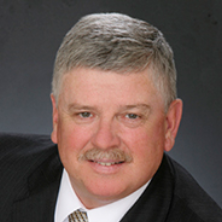
Bob Walker is the Vice President for Continuing Education & Workforce Development. He earned his Bachelor of Science in Electrical Engineering from The Citadel and his Master of Engineering from the University of South Carolina. Bob also earned his A.I.T. in Aircraft Maintenance Technology from Trident Technical College. Learn more about Trident Tech here: https://www.tridenttech.edu/
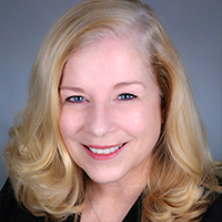
Cathy Almquist is the Vice President for Academic Affairs at Trident Technical College. She has been with the college since 1990 when she joined the faculty as a chemistry instructor. She holds an Associate in Arts from Iowa Western Community College, a Bachelor of Science in Chemistry from the College of Charleston, a Master of Science in Immunobiology from Iowa State University, and a Doctor of Management in Community College Policy and Administration. Learn more about Trident Tech here: https://www.tridenttech.edu/
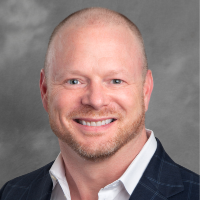
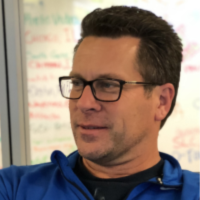

In this interview from the SCAC AIAG Supply Chain & Quality Conference in Charleston, South Carolina, Scott, Greg, and Beau Groover of The Effective Syndicate welcomed Bob Walker and Cathy Almquist from Trident Technical College, to Supply Chain Now Radio.
[00:00:05] It’s time for Supply Chain Now Radio. Broadcasting live from the Supply chain capital of the country, Atlanta, Georgia. Supply Chain Now Radio spotlights the best in all things supply chain the people, the technology’s the best practices and the critical issues of the day. And now here are your hosts.
[00:00:29] Hey, everybody, good afternoon. This is Greg White here with you live on Supply chain Now radio. Welcome to our show. Hey, we’re coming to you live today from the AIAG, S.C. AC. I’ve said that a few times. Supply chain and Quality Conference in Charleston, South Carolina. That is the Automotive Industry Action Group and the South Carolina Automotive Council. The conference is dedicated to automotive and we’re going to be talking with a lot of the industry leaders that are participating. And let me start with some big thanks to our friend Beau Groover and the effect of Cygnet synthy for making this coverage possible. Effective signal syndicate helps company win by optimizing process and developing winning cultures. Learn more at the effective syndicate dot com. All right. On a quick programming note, like all of our series on Supply Chain Now Radio, you can find us on Apple podcasts, SoundCloud, Spotify, my favorite YouTube and wherever use else you get your podcasts. As always, we’d love to have you subscribe, as Scott says, so you don’t miss a thing. Let me welcome my co-host today. I’m I am the master host for the first three minutes of Scott Luton, our founder and CEO.
[00:01:54] So welcome aboard. Hey, thanks. Thanks for joining me. You bet. We’ve had a string of of really compelling conversations that today that have really tackled a wide variety of subject matter from trade to talent to technology to automotive growth. So I think we’re going continue that streak here today with our our special guests.
[00:02:14] Yeah. Thank you for chiming in there. And Bo Gruver, as I said earlier, founder and president of the Effective syndicate co-host and our beloved sponsor.
[00:02:24] Hello, everybody. Good afternoon. Glad to be here. How are you doing? Thanks for having me. If I was any better, I’d be twins. OK, so moving back up again. He’s right. I’m having they’re flowing throughout the day. Well, my other answer is just right. So, I mean, those are two pretty good, aren’t. Yes. Yeah, that’s good. All right, Scott.
[00:02:41] You want to welcome. Yes. Really sad about our two featured guests here today as we’re close to concluding day one of what’s been a great conference here. So first off, Mr. Bob Walker, vice president, continuing education and Economic Development. Bob. Good afternoon. How are you doing? Good afternoon. Fine, thank you. And looking forward to you all y’all’s panel session later today and Cathy Almquist, vice president of academic affairs here at Trident Technical College. How you doing, Kathy? I’m doing fantastic. Good to be with you. Absolutely. So, you know, as we talked about on the warm up show, we want to dive in first before we talk more about the institution here is learning more about about each of you and kind of your journeys to get here in your current role. So, Kathy, I want to start with you. Tell us a bit more about yourself.
[00:03:27] Well, I have worked here at Trident Technical College for 28 years, but to be honest with you, I have always been on a community college campus. My parents were both community college professors, grew up on campus where I will Western Community College, the Clarinda campus. OK. Not the main cannon and expansion and actually have my associate degree from a community college. So other than my stint at the College of Charleston and Iowa State, I have always been on a community college campus. I’m a believer in the system. Wow.
[00:04:03] Loved to hear that. And that comes through loud and clear when you guys are doing great things here. Well, thank you. Yeah. Bob, how about yourself?
[00:04:10] Well, actually, I went into the Air Force right on high school as a jet engine mechanic. And after active duty for six years, I actually came to Charleston to go to Trident Tech in the aircraft maintenance program. So I’m a graduate of this college. And after that, I went on and got my electrical engineering degree. Both a bachelor’s and master’s at the Citadel in the university, South Carolina. And I’ve been here 21 years. Came back in 1998, starting in the engineering technology department as an instructor. And then I moved in to administration about 10 years ago. OK. Did you ever spending time at your job? Yes, I did. I’d go to shore to the altitude chamber. OK. I was a flight engineer and in the reserves on the C-141, which is a predecessor to the C-17. But I’d go to Shaw for the altitude chamber once a year. And then my. Wife is from Sumpter. OK.
[00:05:02] C-141 star lifter. Yes, right. I was part of the 22nd l_s_f_s 20 something years ago at Shaw. It’s been a year. Shaw and who knows? We want to pass each other in the dining hall there. Could have in a jet engine mechanic. Right. You know, those are as we talked about earlier, one early episode called Talent. Right. That’s exactly where my head went. Yeah. Yeah. In-demand. And whether it’s jet engines or whether it’s diesel engines. Now we hear a lot about the truck. This is this is Truck Driver Appreciation Week. So we’ve spent a lot of time giving love to our truck drivers that make it happen and make supply chain economy happen. But you know, what also is not really as much talked about is the need for mechanical skill sets to make supply chain happen across across industry. Right. Right.
[00:05:51] And what’s interesting is, is is across all industries right now, we’re seeing a shortage across industries. It doesn’t matter. It’s mechanics. Logistics, you name it. Engineering is just the way it is.
[00:06:03] And the good news is, is here at Trident Technical College, you’re arguing that the move the needle to address those gaps. Right. Let’s talk more about the mission here. Bob Kathee, who’d like to start?
[00:06:13] Well, I’ll just tell you, the mission of this institution is twofold. But really one fold. We are workforce development are our task. Our mission is to make sure that the three county area that we serve, which is Charleston, Dorchester and Berkeley counties here in South Carolina, that they have an adequate and highly trained and effective workforce so that we can keep the economic engine around here running at all times. And that’s our job. Workforce development. We also have an access piece. We will provide access to higher education. We are an open door institution. So it doesn’t matter how bad you screwed up in high school, you can still go to college because we are open door. But even that access piece is designed around workforce development and even if a student comes here for the first two years to transfer somewhere else. Ultimately we want them to go to work. Yeah.
[00:07:07] Great point. I could have used. You could use your help. So when you said and I love that we are workforce development, I’m thinking of the Penn State chant. We are Penn State. We are. And we didn’t apply that here. Right. And then a different way. That’s a great working. Still, that that T-shirt slogan. We are we’re forced to.
[00:07:27] Yes. It doesn’t really roll off the tongue quite that way. That guy.
[00:07:31] All right. So what else would you add, Bob, to the mission of Trident Tech?
[00:07:35] Well, we also offer a continuing education courses, Kathie’s programs, or on the academic side of the college. And she has over 160 programs. And most all of those lead to some kind of job, as she mentioned. But my side of the college is continuing education. So it’s non-credit training. And this is for folks who may want to get some really quick entry level training to get to work. We also do training for industry where we may go out to their facility and train their in their employees or their employees may come to us and we train in our labs. We also have a lot of open enrollment type of programs in our division, a health care computer, I.T., things like that. And we also do a lot of personal interest things. We have a summer camp for children every year. I think we’ve had like 20 years just this past year and is for children between 7 and 17. And they come either in the morning for a camp or in the afternoon for camp in last five days and is all over. The map is a lot of things like culinary computer programming, music, theater, all kinds of things. So we try to get them early, get ’em interested, and hopefully they’ll come back and be one of our students later.
[00:08:47] Yeah. You know, one thing we found out here in talking with a wide radio folks that are here that Trident Technical College is the third largest institution in the state. That’s why I had no idea, although what a gorgeous in large campus I have just here.
[00:09:02] Right, right. Yeah. And we all you know, this is one of four campuses that we have. It is the largest. But we also have campuses in downtown Charleston. We’ve got one in Mount Pleasant and we’ve got one out in rural Berkeley County. Really?
[00:09:17] So let’s talk more about your specific roles. Real quick. So, Bob, tell us more about what you do here at school.
[00:09:23] Well, as a vice president for continuing education and economic development, what I do is run that division when it’s not running me, but basically offering that opportunity for short term training for workforce, as well as a lot of different things, as I mentioned earlier. But we also try to integrate with the community. The whole lot were out there with the chambers, with the S.R. d._a conferences like this, trying to be out in the community, letting people know what we do and the resources we have that may be able to help them when it comes to their employees and how to enhance their. Employees capability and productivity. Things like that. So a lot of times it’s a lot of being out there, being the face of Trident Technical College and just making people aware of what we have, a lot of people just do not realize the capabilities we have at the college.
[00:10:14] Absolutely. And the scope of what you are touching an impact you’re having. Carthew about you. Tell us more about your role.
[00:10:22] Well, as Bob mentioned earlier, we have 160 credit courses, art, not credit courses, but credit academic programs. Those are associate degrees, diplomas, certificates. All but two of those all but two are designed to put people to work immediately. The two that are are not our transfer programs. They’re designed to let students have the first two years of a four year college degree and then transfer on to the College of Charleston, the Citadel, the University, South Carolina, Clemson, where those are both very large programs. But the other hundred and fifty some-odd plus are all designed to put people to give people work force skills. Some of them designed around a very particular career. We have, for example, a physical therapy assistant program. You get that degree, you go to work as a physical therapist assistant. Others are designed to help someone who already has a skill set to add on to that. We’ve got a host of I.T. certificates that are short term that maybe somebody who’s already working in the I.T. field just wants to come get a very specific skill set around, possibly cybersecurity, possibly a certain type of programming language that can come in and get that certificate relatively short term.
[00:11:38] So how do a job keep your finger on the pulse? There’s a lot of employers here today. I’m sure you all have nonstop conversations about the skill sets are looking for and manufacturing supply chain, you know, elsewhere. How how does creating a new course come about? How do you all help you? You’ll know when to add something new.
[00:12:00] Well, for all of our academic programs that are designed to put people to work. We have an advisory board that is made of employers in that discipline. So each of our academic associate degrees has an advisory board. They meet at least twice a year. And it’s a meeting of folks from the industry and faculty members. We listen very carefully to what they’re telling us about trends in the industry. What they see coming down the pipe. What kind of people they’re looking for. What skill sets they’re finding absent in their in their new hires. What they’re looking for. And then we try to be as reactive as possible and and turn around and make adjustments to our curriculum. And and we do that. We get things rolling pretty quickly.
[00:12:45] You know, Kathy, a lot of what I heard it in your answer is being proactive about seeing around the corner of what employers are seeing flat line and getting out ahead as some of the gaps that that that we know exist and some of the gaps that we find to help exist. Exactly. Really neat to hear that. All right. So obviously, the event here, the AIG mess, SCAC, Supply chain and quality conferences here at Trident Technical College, you are participating. You got a keynote coming up here later today. What the all look most forward to about these events like this, what a all look to get out of events like this.
[00:13:21] Well, is againas networking. A lot of it is networking, getting out and meeting people. There are a lot of folks that we know already, but there are new people that we we meet. And, you know, sometimes you don’t necessarily do anything with them for a while, but then, you know, six months or a year down the road, you know, they are aware of where where you are and how to get in touch with you. And then maybe we can make something happen for them.
[00:13:45] Mm hmm. Catholic harmony is a really specific example here. And that is we’ve got good contacts with the industries that we serve now. But new industry has a tendency to pop up pretty quickly these days. True. And so knowing what’s coming is as important to us as knowing what’s here. And you mentioned it earlier today, diesel mechanics, CDL training.
[00:14:10] We are we’ve heard rumblings about now say we are a workforce development ready for use. We are workforce development. And we’ve heard rumblings about both of those. Yeah.
[00:14:20] And we have plans in place right now to get those programs up and running at our rural Berkeley campus, which we say rural. But compared to compared to some rural, it’s not that it’s just outside amongst Korner, but we are hoping to have CDL training available in January. And while there are other places that you can go to get training to be to get that CDL license, sometimes it’s not accessible.
[00:14:47] It’s not accessible to some of those people for whom getting that license would be a life altering, a family changing event. Right. And you sometimes you got to have the money. To pay for that training before you can get that training, part of our mission is access or make that training accessible people.
[00:15:06] That’s outstanding. Why do I sense that Mike Rowe is probably big fans of you all, you know?
[00:15:13] You know, I see his stuff every once in a while, and I’m always tempted to just reach out and say, I think you should use Zooey’s to get on this campus. I think he has work.
[00:15:21] Absolutely. I mean, look, you know, one of his big statements is, is so many people are spending money on college education and coming out of school with lower income opportunity or no opportunity. Ryder limited opportunity than people who are in the trades and for so long. I don’t know about everyone else around this table, but it was just assumed when I was a kid that we were going to college. Right? Right. I have a 17 year old daughter. I’m trying. I’m actually trying to encourage her to be a plumber.
[00:15:53] So. Well, I think she could make a buck double. Oh, she could. Well, let me tell you a little bit about what we’ve done with regard to younger people and the trades. We have a youth apprenticeship program here that is being rolled out as a model across the country. It was developed in partnership with our local chamber. They were a huge supporter for us. We could not have gotten it off the ground without the local chamber area. Employers are K 12 partners and also Apprenticeship Carolina, which is a statewide initiative to get apprenticeships up and running for Gupton. And he talked with her a just fabulous. This is part two. So what we do with that apprenticeship is we take rising juniors and we have them interview with employers. The employers choose the student that they want to hire. That that young man or woman then spends the next two years in an apprenticeship where they take high school classes. They take college classes with us here at Trident Technical College, and they go to work. And in the summers, they work full time at the end of two years. That kid and they are still kids will have a high school diploma, a college credential from Trident Technical College, a U.S. Department of Labor journeyman credential and two years of paid work experience. Wow. One of our very first youth apprentices bought her own home at the age of 19.
[00:17:17] Nice that. Now see, that is life altering. It really is. And there are that there are many more success stories like. Wow, that’s inspiring. Dozens, I’m sure. So. What are the trends that you guys are looking out at? So, you know, one or two things that you got your eye on.
[00:17:34] There’s a lot of change. You know, new industries pop up, as you mentioned. So what are the things that you’re looking at or watching for?
[00:17:41] Well, we’re about to open on an 80 million dollar South Carolina aeronautical training center probably in the next couple of months. So grand opening is in early November. And Kathy and I’ve been working on that. There’s going to be academic programs as well as continue as vacation programs in the building. Ready, S.C. We’ll have a presence there as well. But one of the things that we’re seeing is it’s always a challenge for a two year Technical college in a state system to be able to afford the technology.
[00:18:07] And the technology’s moving so quickly now that we’re working very hard together to leverage everything. We have all the resources, we have all the equipment, we have the spaces we have to train. But I think we’re going to see more and more partnerships with industry so that we have one foot in their door. They have one foot in our door when it comes to developing curricula and being able to do that. We’re seeing more technicians taking on more and more technical responsibility in the industry, in the manufacturing industry. They’re having to do higher grades and higher levels of were than in years past. I remember when I was a technician in the Air Force, we had a specialty for everything. We had jet engines, we had hydraulics, we had electrical. But you’ve probably heard of mechatronics. And that’s the blending of so many things, the mechanical, the electrical, the computers. And so what industry really needs is somebody who’s able to adapt to more and more responsibility and higher level responsibility. So I think that’s what we’re going to see. And we really have to work closely with industry on this.
[00:19:15] And I just want to second what Bob said about more of a blending, more of an industry presence in what we do, more of our presence and what they do. The same is true with those hard borders that we’ve always seen between K-12 and college, between between the community college and a senior institution. We’ve spent decades putting ourselves into silos. And what we’re realizing now is that’s not going to get us through. We have got to bust through the walls of these silos and figure out how to get all of these different groups to work together to develop the next generation of workers.
[00:19:50] You know, the borders just don’t work. I mean, they never did, but they they certainly don’t work now. And I think, you know, we’ve got a vocal enough student pop. Flation to actually say something about it and be meaningful. Absolutely right. I mean, how many people left high school and had no idea how to get a job and no experience? Likewise with a with a JUCO degree or even with a with a college degree got out of school. And the first requirement with any job that you go to is do you have any experience in the first question you want to ask yourself when you get out of colleges? Why did I go to college?
[00:20:25] And that’s the beauty of that apprenticeship type of program. Exactly where, when, when. The first question is, what’s your experience? That 18 year old can say, I have two years of experience, run this CNPC machine over here or whatever it is they’ve been apprentice that day.
[00:20:41] And what’s really cool is we’ve had a number of these students who have actually gone to work with an employer and that employer has turned around and said, we’ll fund you going to get your bachelor’s degree in engineering or whatever it sounds, you know.
[00:20:55] And so now they’ve they’ve already got a foot in the door with an employer. And that employer is going to help them continue on with their education and take higher and higher levels of responsibility in the company.
[00:21:05] But we have to find more. We have to. We’re punching holes in the walls of the silos right now. We got to find ways to completely tear those walls down completely with you.
[00:21:15] So before Greg’s always curious about folks looking around the corner.
[00:21:19] Especially as you all have a great view around the corner. But go ahead.
[00:21:25] Any other any other industry trends or challenges that that you all have been talk about a team we’re talking with your advisory board about before we kind of get your fearless prognostications for 2020?
[00:21:36] I’ll just say it’s it’s it’s really, really hard to stay on top of workforce development when an entire new industry can come to town and change your entire culture overnight. One of the things that we have learned across this last decade, and it’s only been a decade since Boeing announced that they were going to establish a plant here. We have completely shifted the economy of this area. And I think that we’ve done a reasonable job of trying to keep up with that. But if I were to say anything to any other community college, it’s stretch all the time because we like to think that we’re flexible. But then when the challenge comes to really try that flexibility and really see just how flexible you are, you may find that you’ve gotten a little stiff in your joints. So keep flexing all the time. Keep changing, keep reacting. It’s almost impossible to keep up because we don’t know what the next industry is going to be. But as long as you keep that keep that wheels rolling and keep moving in a positive direction, you can get them an example of that.
[00:22:45] As with the Aeronautical Training Center, we actually started that project back in around 2013. And really then the focus was Boeing and that was a real important focus. But then in 2015, Volvo announced and then Mercedes Benz announced. And so now our direction broadened into more advanced manufacturing. So that’s kind of an example of us trying to be very nimble when it comes to what we’re doing as far as programming for the area.
[00:23:16] So the chambers of commerce and in governors and other politicians, they’re working to get those companies here. Is there any way for you to have greater insight through those? I’m sure you’re trying to do that. And I’m sure they try to give you some insight as well. But they do.
[00:23:33] They they they’re pretty good about trying to give us as many hints as they possibly can. But, of course, you know, with with so many of these things, you don’t get to know about the industry arriving until they until suddenly there’s a group of people breaking ground somewhere. So a good a good example for us is W International, which there was a group that knew that they were coming. They referred to them as Operation Whiskey. But for a long time, we didn’t even know what that industry was going to be about. And then they let us know that they needed welders and then they let us know that they needed 30 welders a month for the next three years. Holy cow. And I’m thinking, well, we produce 30 welders a year ago. So we had to ramp up and ramp up fairly quickly to try to help address that big workforce need. But sometimes you don’t have much time to do that. Sometimes you really got to turn on a dime.
[00:24:25] That’s a really good practical example of keeping your flexibility. That’s right. I mean, because that that is a dramatic change.
[00:24:34] So we’ve got to understand, y’all got a keynote just around the corner here. So why Greg has work with some of us have. Let’s talk to you, too.
[00:24:44] Bob, I could stay and talk all day. All right. Just we had an open seat. Well, it’ll be a mini series, so. So I have to ask this.
[00:24:51] So imagine you have a crystal ball. Right. Imagine it’s not something surprising coming from the government. With only hints or not even hints, any bold predictions for the next year. Look at her, look at you. She can make you go first.
[00:25:08] I don’t know if I can make any bold predictions, any boring thing or, you know, again, I think it’s gonna. This is for us in Trident Technical College, one of 16 technical colleges in the state and the third largest higher education institution in the state.
[00:25:25] I think we’re going to be working very hard when we opened this aeronautical training center because it is just a completely different ballgame for us. And so we’re gonna have our hands full for the next year.
[00:25:38] And to be honest with you. When we were working through this, I contact some folks out at Wichita State and I said, I’m hoping we can get our legs under us in three years. And and the person said, I think it took us five, but we really have so much opportunity on the horizon with this center. And so I think this is going to consume us for the next. Good, good, good. A little bit of time. Absolutely.
[00:26:05] Advanced manufacturing. Advanced manufacturing and. And keeping our transportation and Logistics ahead of what is being manufactured. You know, it doesn’t matter how many things you can produce. If you don’t have any way to get them off of the shop floor. So those are the those are the two areas that I see really exploding and changing across the next several years. And I’d echo what Bob said about better partnerships with business and industry so that we develop the right curriculum for them. Right?
[00:26:38] Well, I think there’s a lot of bacon to the sounds like the DNA of the leadership team here that you’re you’re you’re are addressing the need now while progressively and actively and and not you couldn’t put your finger on the pulse. It’s like our passion for health. Look around the corner of what’s going be needed next. And I think that for me is as a breath of fresh air. I mean, we think we’ve seen similarly, I’ve sat down with a variety of educational leaders toward Dr. Sean Montgomery at UIGEA is all about getting students out and connecting with the real world in a way that is that I didn’t experience when I was in school. So great. I love to hear the leadership level here, the passion that comes from from both of you all. And we’re going to come back and check in on this big aeronautical project. Which one is that glove?
[00:27:29] Well, we’re having a grand opening on November 8th. Ironic one. We’re already offering classes. I mean, we’re moving in and starting we started classes on the 26 of August and we had to move everything that was up at the Berkeley campus and most corner down all the aviation programs that Kathy has, all the airplanes, all the airplane planes.
[00:27:49] Real quick, how can folks you have so much going on, but how can our listeners reach out and learn more?
[00:27:56] Well, our Web site is w w w dot Trident Tech. Dot e._d._u. And if you search through that, you should be able to find our contact information Web sites a good place to start.
[00:28:07] And if you’re really interested in getting started with some classes, you can also call our information line 8 4 3 5 7 4 6 1 1 1. And whoever answers that phone will get you where you need to be.
[00:28:18] Love it. Okay. Well, we’ve been talking with Bob Walker Vice President Continue Education and economic development with Trident Technical College and his colleague Cathy Almquist Vice President, Academic Affairs at the same. Pleasure to speak with you both. Thanks for carbon time out. Thanks for having us. You bet. All right. So we’re going to wrap up in an expedited fashion on some upcoming events. And we’ve talked about Bo, the Effective syndicate, the vano 920. We’ve got the Georgia Manufacturing Summit on October 9th. You can learn more at our events tab at Supply Chain Now Radio dot com. On behalf of Bob and Kathy and Greg and Bo to our audience, be sure to check out other upcoming events, replays for interviews, other resources at Supply Chain Now Radio dot com. You can find us an Apple podcast, SoundCloud, YouTube, Greg White and all the leading sites my podcast can be found. Be sure to subscribe Schoolman see thing on behalf the whole team. Hope for you. Enjoyed this this episode. Supply Chain Now Radio. Have a wonderful week and we will see you next time on Supply Chain Now Radio radio. Thanks for writing.
Upcoming Events & Resources Mentioned in this Episode
Help with Hurricane Dorian Relief: https://www.alanaid.org/
Connect with Bob on LinkedIn: https://www.linkedin.com/in/walker-bob-95802414/
Connect with Cathy on LinkedIn: https://www.linkedin.com/in/catharine-almquist-d-m-70574357/
Connect with Beau on LinkedIn: https://www.linkedin.com/in/beaugroover/
Connect with Greg on LinkedIn: https://www.linkedin.com/in/gswhite/
Connect with Scott on LinkedIn: https://www.linkedin.com/in/scottwindonluton/
SCNR to Broadcast Live at SC Logistics 2019 Fall Tech Talk: https://tinyurl.com/y2mttrg8
eft Logistics CIO Forum in Austin, TX: https://tinyurl.com/y5po7tvw
Reverse Logistics Association Conference & Expo: https://rla.org/calendar/1
SCNR to Broadcast Live at MODEX 2020: https://www.modexshow.com/
SCNR on YouTube: https://tinyurl.com/scnr-youtube
Check Out News From Our Sponsors
The Effective Syndicate: https://www.theeffectivesyndicate.com/blog
Spend Management Experts: https://spendmanagementexperts.com/
APICS Atlanta: https://apicsatlanta.org
TalentStream: https://talentstreamstaffing.com/
Verusen: https://www.verusen.com/
Georgia Manufacturing Alliance: https://www.georgiamanufacturingalliance.com/
ProPurchaser.com: https://tinyurl.com/y6l2kh7g
Supply Chain Real Estate: https://supplychainrealestate.com/
Vector Global Logistics: http://vectorgl.com/


